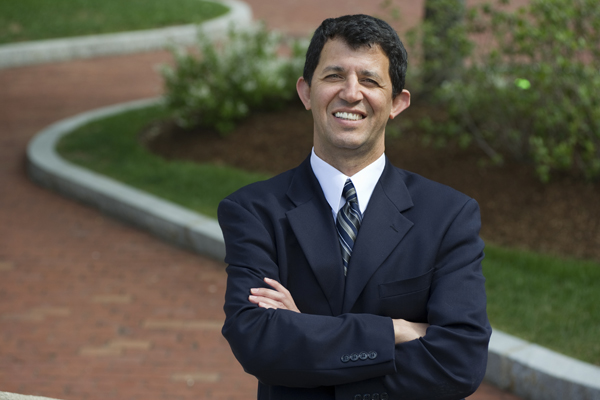Northeastern awarded NIH grant to study links between contaminants, preterm birth

Northeastern University has received a five-year, $13.5 million award from the National Institutes of Health to continue its interdisciplinary investigation into the complex relationship between environmental contamination and preterm birth.
The multi-university research team previously received a $10 million NIH National Institute of Environmental Health Sciences’ Superfund Research Program grant in 2010 to establish the Puerto Rico Testsite for Exploring Contamination Threats (PROTECT) Center. The latest grant from the NIH will fund the next phase of a study of the extent to which exposure to commonly found chemicals, such as phthalates, is related to the extremely high preterm birthrate in Puerto Rico.
“An academic research enterprise is at its best when it can bring the brightest and most innovative minds together to solve real problems that will make a difference in people’s lives—whether that impact is local or halfway across the world,” said Stephen W. Director, provost and senior vice president for academic affairs. “The support of the federal government is critical to achieve our goals and to advance scientific research across disciplines.”
Puerto Rico’s preterm birthrate is about 17 percent. At 50 percent above the U.S. average, it is the highest rate of any U.S. jurisdiction and below only Malawi (18.1 percent) globally. Puerto Rico also has many “Superfund” sites—locations identified as high-risk for the public by the Environmental Protection Agency—in addition to more than 200 potential hazardous waste sites throughout the island.
Over the past three years, the team has documented significant contamination in the study areas and compelling preliminary associations between contaminants and preterm birth.
“We’ve seen extensive contamination, and women in the study area have been exposed to higher concentrations than those in the U.S.,” said Akram Alshawabkeh, PROTECT’s principal investigator and a professor of civil and environmental engineering at Northeastern.

PROTECT uses a holistic system of research, training and stakeholder engagement to study contaminant exposure and its connection to preterm birth in Puerto Rico and beyond.
While the team’s research focuses on sites in Puerto Rico, the work has global implications. According to Alshawabkeh, reducing preterm birth rates will help save lives and minimize the escalating costs of healthcare. Preterm birth is the second leading cause of death in children under the age of 5 worldwide and the leading cause of perinatal and infant mortality in the U.S.
“This recognition by NIEHS enhances the college’s reputation and capability for interdisciplinary research, as well as demonstrating our leadership in addressing important societal issues,” said Nadine Aubry, dean of Northeastern’s College of Engineering.
In addition to an epidemiological study that tracks the environmental exposures of 1,800 pregnant women, PROTECT’s research projects include identifying toxicologic explanations for the connection between exposure and preterm birth; identifying xenobiotics (foreign chemical substances) that contribute to preterm birth; examining groundwater systems to understand how and where contaminants are transported; and developing sustainable, solar-powered, and environmentally-friendly technologies for the remediation of contaminated groundwater.
PROTECT—which includes Northeastern, the University of Puerto Rico, and the University of Michigan—is co-directed by Alshawabkeh and Jose F. Cordero, dean of the Graduate School of Public Health at the University of Puerto Rico. The interdisciplinary team includes faculty members from Northeastern’s College of Engineering, Bouvé College of Health Sciences, and College of Social Sciences and Humanities. To support its mission, PROTECT also engages with government agencies and nonprofit organizations such as March of Dimes and the Silent Spring Institute.
The project’s interdisciplinary focus, Alshawabkeh said, is critical to its success. The research team includes engineers, chemists, health scientists, and toxicologists, and its work includes conducting studies, developing new technologies, and identifying strategies for policymakers to address the problem.
“When you look into a problem from only one specific discipline, you’re solving one part of it,” Alshawabkeh said. “But the problems we’re facing as a society today are multi-layered. This team is working together to facilitate a greater understanding of this problem from many levels and identify diverse ways to solve it.”






